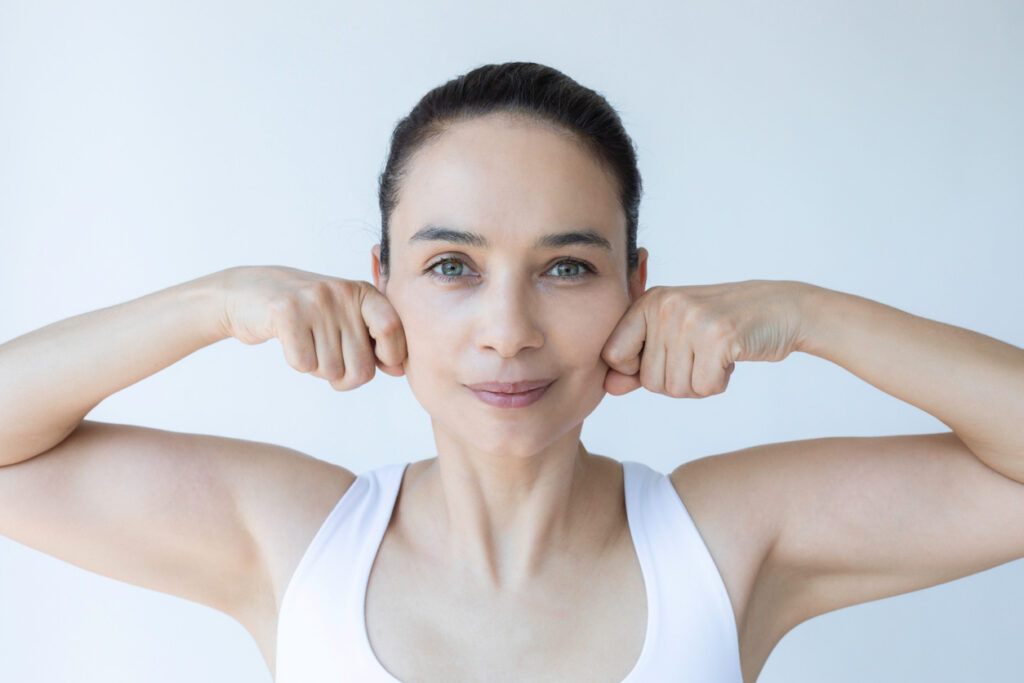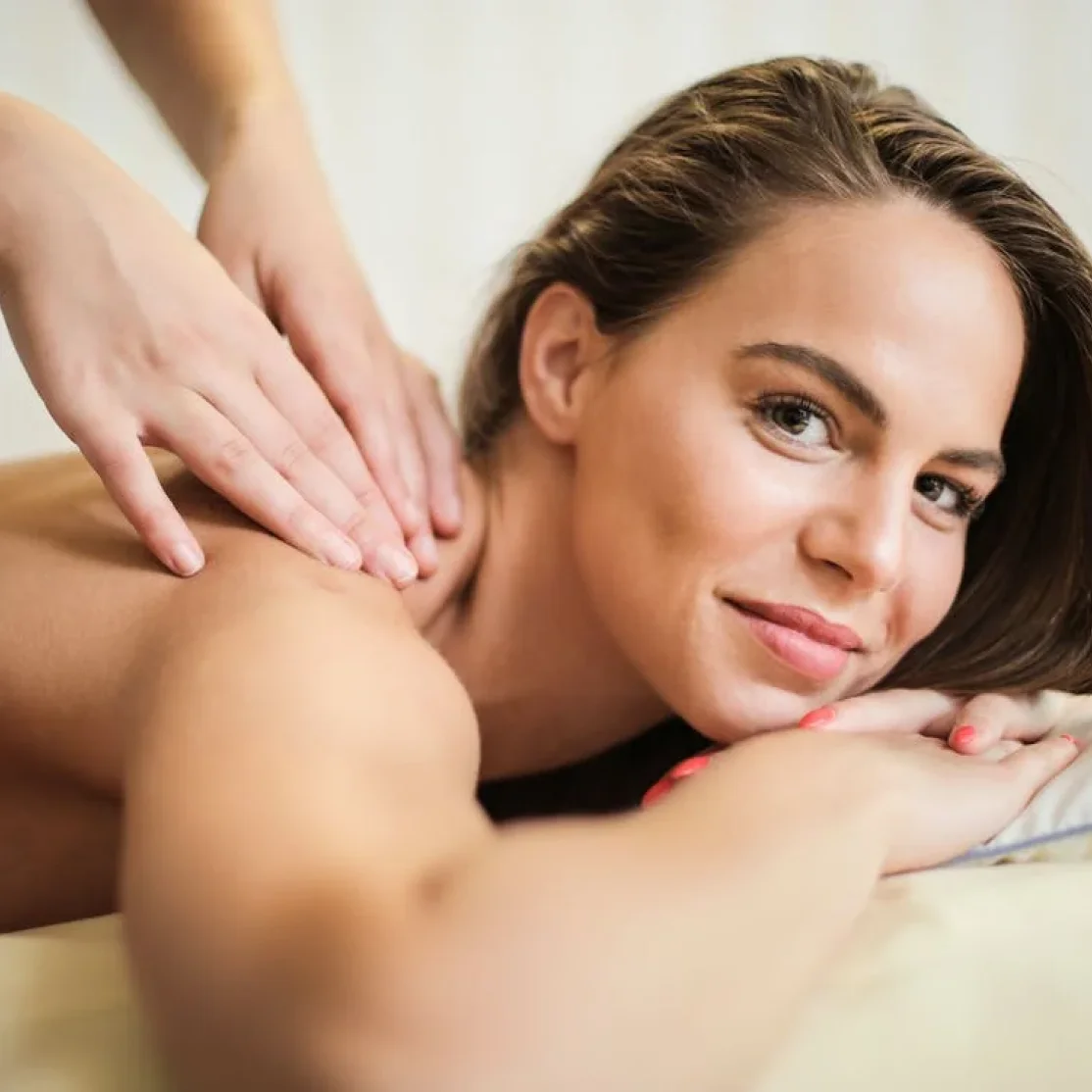Hold that Smile: Face Yoga Touted as a Natural Facelift

As we age, our faces naturally lose fat and muscle tone, contributing to an older appearance. Common skincare routines, like wearing sunscreen and moisturizing, don’t always fully address this tissue atrophy over time, and concerned consumers often improve their complexion with dermal fillers, Botox or plastic surgery. Face yoga is an emerging self-care trend designed to address the loss of muscle tone in the face as we age and provide a natural alternative to more invasive cosmetic procedures, but how effective is it?
Goals of Face Yoga
Overall, face yoga incorporates exercises, stretches, massage and acupressure for face and neck muscles. There are three goals of the practice:
- Improve muscle tone and strength
- Increase blood flow and circulation
- Reduce tension and muscle strain
Ideally, improved muscle tone reduces sagging skin around the face and neck, creating a younger appearance. Gentle massage using serums or lotions and muscle movement in turn increase blood flow to improve complexion. Retraining facial muscles can also reduce facial muscle tension and strain to reduce fine lines, wrinkles and headaches.
Benefits of Face Yoga
Face yoga experts tout many cosmetic, health and psychological benefits of face exercises despite few in-depth studies on the practice. Besides the overall goals of face yoga, experts list additional benefits, including:
- Increased face definition
- Younger-looking skin
- Prevention of new fine lines and wrinkles
- Reduced puffiness and under eye circles
- Pain relief
- Reduction in scar appearance
- Stress relief and improved mental health
- Safe, natural alternative to cosmetic procedures
And while there is a lack of in-depth studies into the effectiveness of face yoga, there are a handful of studies that demonstrate a measurable benefit in some aspects of the practice.
- One study published in JAMA Dermatology of women between 40 and 65 years old is often referenced to demonstrate the benefits of face yoga. The study found that participants who practiced face yoga for 30 minutes every day for eight weeks and every other day for an additional 12 weeks improved cheek fullness and looked about three years younger. There was no improvement in fine lines or wrinkles.
- Another study in elderly adults between 65 and 87 years old found that practicing facial exercises two times per week for 30 minutes per session over 12 weeks may help mental health, but cosmetic effects were not assessed in the study.
Potential Pitfalls of Face Yoga
Despite the possible benefits of face yoga, there is one critical way that face yoga may diminish skin appearance: through repetitive movement of the skin.
It’s no secret that laugh lines and crow’s feet develop through the repeated muscle contractions associated with smiling and squinting. As skin ages, it loses elasticity and any lines or wrinkles in the skin deepen over time.
Face yoga has the potential to make similar facial lines or wrinkles depending on the muscle contractions and how often they are repeated. Botox, in contrast, reduces wrinkles by discouraging the movement of facial muscles. Face yoga could also decrease skin elasticity and increase the risk of acne through excessive manipulation of the skin.
In order to avoid the development of new wrinkles, experts suggest delicate movement of the face and skin and the use of non-comedogenic lotions or oils while massaging the face. Proper hand washing is also helpful in limiting acne risk. Importantly, increased face movement, massage and/or manipulation can decrease the life of dermal fillers used to additionally enhance appearance.
Starting a Face Yoga Practice
Many videos and websites offer face yoga exercises and massages for beginners interested in starting the practice. Face yoga expert Danielle Collins offers a variety of free routines on her YouTube channel. Many practitioners recommend a 20-minute face yoga routine that is repeated five to six days per week to start. It may take three to four weeks to see results.
The participants from the previously mentioned 2018 JAMA Dermatology study performed a series of 32 facial yoga exercises for about one minute each every day for eight weeks and every other day for an additional 12 weeks. This study resulted in modest facial appearance improvement for the women participating in the study. The following face yoga poses are taught by Happy Face Yoga, the studio that taught participants the exercises used in the study.
- Cheek Lifter: Open your mouth and form an “O” shape.
Move your upper lip down to cover your teeth.
Smile, lifting the cheek muscles up.
Place your fingers on the upper cheek before releasing
your smile to lower the cheek muscles.
Smile again to lift the cheeks.
Repeat the exercise by lowering and lifting the cheek muscles ten times.
- Happy Cheeks Sculpting: Form a closed-mouth smile that doesn’t show your teeth.
Press your lips together firmly and smile to make the cheek muscles move up.
Press your fingers at your mouth corners and move them to the top of the cheeks.
Hold this pose for 20 seconds.
- Eyebrow Lifter: Push your first three fingertips of each hand under each
eyebrow to open your eyes.
Form a smile while pushing your eyebrows down against your fingers.
With closed eyes, roll your eyes up to the top of your head.
Hold this pose for 20 seconds.
While the effects of face yoga may be modest, many celebrities, influencers and practitioners swear by the practice and its positive effects on appearance, complexion and mental health. The exercises present few risks beyond the potential to form new fine lines and wrinkles and can be performed at home with minimal equipment and expense. Personalized face yoga options and classes are even popping up at med spas worldwide and on popular self-care websites like ClassPass, making face yoga an easy wellness trend to incorporate into your daily routine.
